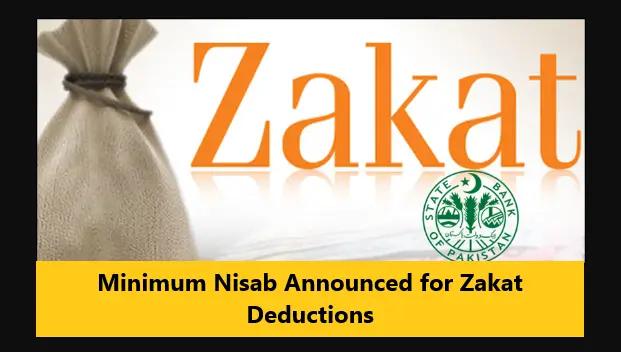Minimum Nisab Announced for Zakat Deductions.
New Zakat Nisab Announced: What You Need to Know for Zakat Year 1444-45 AH (2024)
The Zakat year 1444-45 AH (2024) is approaching, and with it comes the mandatory obligation of Zakat for eligible Muslims.
Recently, the Administrator General Zakat announced the minimum Nisab, the threshold at which one’s wealth becomes subject to Zakat.
This content post provides a comprehensive overview of the latest Zakat Nisab and its implications for your upcoming Zakat obligations.
Key Points:
- Nisab set at Rs. 135,179: As of March 7, 2024, the minimum Nisab for Zakat in Pakistan has been established at Rs. 135,179. This means that if your total wealth (excluding specific exemptions) is less than Rs. 135,179 on the first day of Ramadan 1445 AH (expected between March 12-13, 2024), you are not required to pay Zakat.
- Zakat deduction at source: Zakat will be automatically deducted at source from eligible accounts such as savings bank accounts, profit and loss sharing accounts, and similar accounts if the balance exceeds Rs. 135,179 on the first day of Ramadan.
- Zakat Collection Control Agencies (ZCCAs) notified: The ZCCAs have been instructed to follow this new Nisab and promptly deposit collected Zakat into the designated Central Zakat Account.
- Zakat: A pillar of Islam: Zakat, one of the five pillars of Islam, is a mandatory act of worship that involves giving away a specific portion of your wealth to the underprivileged.
- Administrator General Zakat: Ensuring transparency: The Administrator General Zakat plays a crucial role in overseeing Zakat collection and distribution, guaranteeing these funds reach the most vulnerable segments of society.
Understanding Zakat:
Zakat is a cornerstone of Islamic social justice, fostering inclusivity and helping those in need. It is an act of purification of wealth and demonstrates your commitment to social responsibility. The Zakat rate is 2.5% of your total wealth (excluding exemptions) that has been in your possession for a full lunar year.
Calculating Your Zakat:
If your wealth exceeds the Nisab, you can calculate your Zakat obligation by:
- Identifying your total wealth: This includes the fair market value of your possessions like cash, investments, gold, and other assets (excluding specific exemptions like your residence and essential belongings).
- Excluding exemptions: Certain items like your primary residence, essential household items, and personal belongings are exempt from Zakat calculations.
- Subtracting debts: Deduct any verifiable debts you owe from your total wealth to arrive at your net Zakat-able wealth.
- Applying the Zakat rate: Once you have your net Zakat-able wealth, multiply it by 2.5% to determine your Zakat amount.
Resources and Support:
For further guidance and accurate Zakat calculations, you can:
- Consult official resources provided by the Administrator General Zakat or reputable Islamic institutions.
- Utilize online Zakat calculators available on various websites.
- Seek guidance from qualified Islamic scholars or financial advisors specializing in Zakat.
Conclusion:
Paying Zakat is a fundamental obligation for eligible Muslims and an opportunity to contribute towards a more just and equitable society. By understanding the new Zakat Nisab and how to calculate your Zakat, you can fulfill this important religious duty and contribute to alleviating poverty and hardship.
Note: The information above might not be accepted 100%. Please verify from your own sources. We will not be responsible for any kind of loss due to our content.
For more news, please visit Munafa Marketing.




